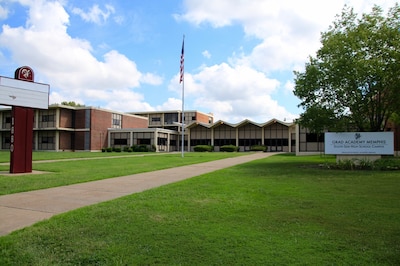The high cost of busing students from across Memphis to maintain the enrollment of GRAD Academy was a major factor in a national charter network’s decision to close the state-run high school.
Project GRAD USA announced plans last week to shutter its only Memphis school after four years as part of Tennessee’s Achievement School District. Besides high transportation costs, the burden of maintaining an older school building and a dip in enrollment created an unsustainable situation, charter organization officials said this week.
“Higher-than-projected transportation and facilities costs were major contributors to the operational challenges that GRAD Academy encountered,” CEO Daryl Ogden told Chalkbeat.
GRAD Academy will become the third state-run charter school to close in Memphis since the ASD began operating schools in the city in 2012. KIPP Memphis and Gestalt Community Schools closed one school each last year, citing low enrollment and rising operational costs.
This is the first school year that GRAD Academy didn’t meet its enrollment targets, according to Ogden. The high school started the school year with 468 students, a drop of about 13 percent from the 2016-17 year.
Ogden said enrollment constraints significantly hurt the operator’s ability to recruit students to the South Memphis school.
Unlike most ASD schools, GRAD Academy started from scratch. It was not an existing low-performing school taken from the local district and assigned to a charter operator with the charge of turning it around. As a “new start,” the high school could only recruit students zoned to other state-run schools or the lowest-performing “priority schools” in Shelby County Schools.
Most of the ASD’s 31 remaining schools were takeovers and are allowed to recruit up to 25 percent of their student bodies from non-priority schools. (Now, a 2017 state law prohibits the ASD from creating new schools.)
GRAD Academy was not required to provide cross-city transportation but, because the school did not have a neighborhood zone, chose to as a way to build enrollment.
“Students were coming from all over Memphis, since there is not a zoned area around the school, and that began to be a challenge with attracting students,” said Kathleen Airhart, the ASD’s interim superintendent. “Their transportation costs were much higher than their counterparts in the ASD.”
Airhart said the State Department of Education has been working closely with GRAD Academy since becoming aware of its financial issues last October. She noted concern over whether the school had the funds to stay open through May, and the state worked with administrators to reduce expenses and streamline funding.

Both state officials and Ogden declined to specify how much the school spent annually on transportation and building maintenance but said that the cost of facilities was also an issue. GRAD Academy rented and maintained the building that formerly housed South Side High School, originally built for 2,000 students and shuttered in 2015 by Shelby County Schools.
Airhart is working with two other ASD charter operators — Green Dot Public Schools and Frayser Community Schools — to offer GRAD Academy students a high school option next year. ASD officials will host a meeting at the school Tuesday evening to answer questions from parents and students about the closure and their options.
The impending closure of GRAD Academy is another blow to the ASD. It’s the state-run district’s highest-performing high school and has its largest percentage of high school students scoring on grade level, according to state data from 2017.
Airhart commended the school for its career and technical focus on engineering and coding — two pathways that could lead to dual certification for students.
“The goal would be to transition the two programs and equipment to Frayser Community Schools or Green Dot,” Airhart said, adding that the details haven’t been finalized.
Many GRAD students felt their voices were lost in the decision to shutter their school, according to Kyla Lewis, a 2017 alumna who is still involved in the school’s poetry team. She called the news “heartbreaking but not surprising” and added that teacher and principal turnover was high during her years there.
“South Memphis has seen so much school closure and this hits hard for kids actually from the neighborhood,” said Lewis, now a freshman at the University of Memphis. “I don’t agree with the decision, but the main issue I saw was the thinning out of teachers. Once the best teachers left, by my senior year, the school culture was starting to fall apart.”
Ogden commended his team for the school’s academic strides, but acknowledged that “faculty and staff turnover associated with urban school reform” was a major challenge.
“There has been a continual need to reinvest in our staff and introduce our culture process and learning and development philosophy to new colleagues, which can slow academic momentum,” he said. “There is a persistent national, state, and local shortage of highly qualified, experienced math teachers which we, along with all of our fellow Memphis school operators, especially at the secondary levels, have had to work hard to overcome.”
Editor’s note: This story has been updated to show that a Nov. 18 parents meeting has been rescheduled to next week due to wintry weather.

